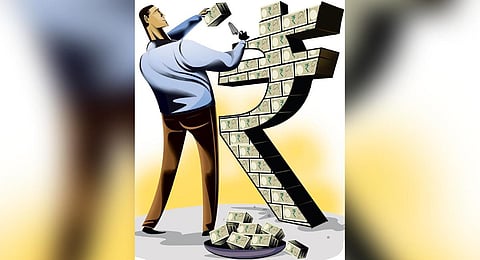

The world is witnessing some serious fireworks. Death and destruction is the story due to conflicts in Gaza and Ukraine. High inflation around the world is leading to high-interest rates. Gold prices and US-dollar-denominated assets are up significantly, indicating a flight to safety. Bond yields on 10-year government bonds of significant countries continue to remain firm. Experts predict a recession in America and a sharp fall in equity asset prices worldwide.
In the backdrop of all of that, a lot of youngsters are looking at ‘living in the moment’. Surveys show that Gen Z is interested in the concept of ‘soft saving’, where you focus on economic and mental well-being. The outrage in social media over Infosys founder N R Narayana Murthy’s 70-hour work week statement is possibly due to that frame of mind for those born after the year 2000. It is a sort of emotion people had in the 60s in America. The idea of all-round growth and not just economic matters. However, that cannot happen by cutting corners in your long-term goals.
Humans tend to find an easy way out when the going gets tough. ‘Living in the moment’ is one such answer to tough financial times. Inflation is eating into savings and hurting people’s livelihoods. You are forced to earn more just to maintain your existing lifestyle. Some experts argue that the impact of inflation is such that the current generation of young people is effectively making less money than their parents.
Financial planning is an exercise that can help you create space for ‘living in the moment’ events. While you cannot plan for the things that define that particular moment, you can keep a provision to deal with the economic cost of such a moment.
To get to that, you need to understand the risk to your money. For example, if you wish to backpack to the Himalayas or Europe for a month or do something else spur of the moment, it is not just the cost of such a trip that is enough. There is an aftermath,too. When you return, you may quit your regular job and become a freelancer or professional. You may start up on your own. It is safe to assume you are prepared for the rocky path ahead.You need to have an adequate amount in the bank.
Not long ago, we discussed the ‘Financial Independence, Retire Early’ concept. That entails leading a frugal life by giving up a regular job for the next ten years. However, it also involves saving and investing a lot too. According to a recent survey published on CNBC.com, Gen Z plans not to retire at all. The idea is to work towards rewarding experiences rather than just earning money.
As a result, more and more Americans are saving less. In India, it is no different. Although Indians save much more than Americans, the share of financial savings has fallen sharply over the past few years. Most households rely on personal loans to finance consumption expenditures. An essential read of the RBI monthly bulletin that publishes the household savings data will show the sharp increase in consumer loans. It also shows a sharp fall in financial savings as a percentage of GDP.
Instead of arguing about a generational clash, you must focus on using common sense in tackling inflation and the aftermath of that. Every dream can be categorised as a long-term and short-term financial goal. You can plan your investments according to your idea of such goals. If you agree to do that, you must make an appropriate asset allocation of your monthly surplus towards these goals. If you cannot do that yourself, you should get a professional financial advisor to help you.
While you fulfil your ‘living in the moment’ idea, you can also put aside a tiny amount today for your retirement. You will not realise that a small amount invested in the BSE Sensex or the NSE Nifty regularly can ride on the magic of compounding and beat inflation.